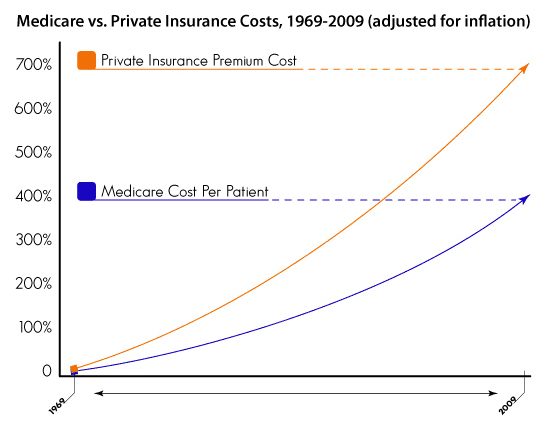Sometimes it takes just a couple of numbers to clarify a huge, complex issue–In this case, what to do about Medicare. Medicare costs are up 400% since 1969–scary, right? But private health insurance premiums in the same period are up 700%–nearly twice as scary.
In today's New York Times, economist and columnist Paul Krugman uses these figures to take on a seemingly moderate attempt to reform Medicare, after a plan to do away with direct funding of Medicare (the GOP budget plan) died in the Senate. The new plan, from Sen. Joe Lieberman, is to raise the age of eliigibility for Medicare from 65 to 67. The plan would toss 65- and 66-year-olds back to the private market to buy health insurance on their own–in the name of "saving" Medicare. But just like the GOP plan to privatize all Medicare, Lieberman's idea fails from the start.
Krugman acknowledges that Medicare is a huge and rising cost–up 400%, adjusted for inflation, since its inception in 1969. But what about private insurance? Up 700%:
So while it’s true that Medicare has done an inadequate job of controlling costs, the private sector has done much worse. And if we deny Medicare to 65- and 66-year-olds, we’ll be forcing them to get private insurance — if they can — that will cost much more than it would have cost to provide the same coverage through Medicare.
By the way, we have direct evidence about the higher costs of private insurance via the Medicare Advantage program, which allows Medicare beneficiaries to get their coverage through the private sector. This was supposed to save money; in fact, the program costs taxpayers substantially more per beneficiary than traditional Medicare.
Krugman cites all the familiar figures from the rest of the developed world, where some mix of public insurance with some private elements manages to cover almost everyone and at a much lower cost than in the United States. But that less-private system of health care been taken off the table in this country by the private corporate interests who profit from the expensive mess of a health care system we have now.
But further privatizing health care, especially for the elderly, is very far in the wrong direction–even the seemingly moderate proposal by Lieberman to up the Medicare age to 67. From Krugman:
Not every 65- or 66-year-old denied Medicare would be able to get private coverage — in fact, many would find themselves uninsured. So what would these seniors do?
Well, as the health economists Austin Frakt and Aaron Carroll document, right now Americans in their early 60s without health insurance routinely delay needed care, only to become very expensive Medicare recipients once they reach 65. This pattern would be even stronger and more destructive if Medicare eligibility were delayed. As a result, Mr. Frakt and Mr. Carroll suggest, Medicare spending might actually go up, not down, under Mr. Lieberman’s proposal.
These are crazy times in government, when leading politicians see a for-profit industry as the way to cut Medicare spending. Especially when the for-profit industry is driving spending much faster than the government alternative.
And for those who say it's not just about money, that the private market does a better job overall–guess what? Medicare is better on all counts, according to a major 2002 study by the Commonwealth Fund. The study's bottom line: "Medicare outperforms private sector plans in terms of patients' satisfaction with quality of care, access to care, and overall insurance ratings."
So yes, Medicare needs better cost controls, but it's already cheaper–and better–than private insurance would be for Americans who are 65-plus. The real conundrum is how to get the same better deal for the rest of us.











